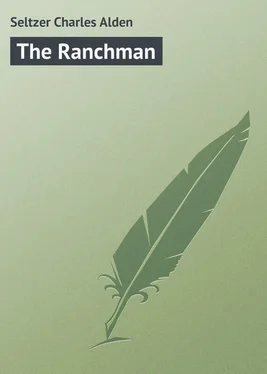Charles Seltzer - The Ranchman
Здесь есть возможность читать онлайн «Charles Seltzer - The Ranchman» — ознакомительный отрывок электронной книги совершенно бесплатно, а после прочтения отрывка купить полную версию. В некоторых случаях можно слушать аудио, скачать через торрент в формате fb2 и присутствует краткое содержание. Жанр: foreign_prose, на английском языке. Описание произведения, (предисловие) а так же отзывы посетителей доступны на портале библиотеки ЛибКат.
- Название:The Ranchman
- Автор:
- Жанр:
- Год:неизвестен
- ISBN:нет данных
- Рейтинг книги:3 / 5. Голосов: 1
-
Избранное:Добавить в избранное
- Отзывы:
-
Ваша оценка:
- 60
- 1
- 2
- 3
- 4
- 5
The Ranchman: краткое содержание, описание и аннотация
Предлагаем к чтению аннотацию, описание, краткое содержание или предисловие (зависит от того, что написал сам автор книги «The Ranchman»). Если вы не нашли необходимую информацию о книге — напишите в комментариях, мы постараемся отыскать её.
The Ranchman — читать онлайн ознакомительный отрывок
Ниже представлен текст книги, разбитый по страницам. Система сохранения места последней прочитанной страницы, позволяет с удобством читать онлайн бесплатно книгу «The Ranchman», без необходимости каждый раз заново искать на чём Вы остановились. Поставьте закладку, и сможете в любой момент перейти на страницу, на которой закончили чтение.
Интервал:
Закладка:
Taylor had no intention of presuming anything. Not even the porter’s story of the girl’s interest in him had affected him to the extent of fatuous imaginings. A woman’s curiosity, he supposed, had led her to inquire about him. He expected she rarely saw men arrayed as he was – and as he had been arrayed the day before.
The girl’s gaze went from Taylor to the street in the immediate vicinity of the station, and for the first time since alighting on the platform Taylor saw a mass of people near him.
Looking sharply at them, he saw many faces in the mass that he knew. They all seemed to be looking at him and, with the suddenness of a stroke came to him the consciousness that there was no sound – that silence, deep and unusual, reigned in Dawes. The train, usually merely stopping at the station and then resuming its trip, was still standing motionless behind him. With a sidelong glance he saw the train-crew standing near the steps of the cars, looking at him. The porter and the waiter with whose faces he was familiar, were grinning at him.
Taylor felt that his own grin, as he gazed around at the faces that were all turned toward him, was vacuous and foolish. He felt foolish. For he knew something had attracted the attention of all these people to him, and he had not the slightest idea what it was. For an instant he feared that through some mental lapse he had forgotten to remove his “dude” clothing; and he looked down at his trousers and felt of his shirt, to reassure himself. And he gravely and intently looked at his prisoners, wondering if by any chance some practical joker of the town had arranged the train robbery for his special benefit. If that were the explanation it had been grim hoax – for two men had been killed in the fight.
Looking up again, he saw that the grins on the faces of the people around him had grown broader – and several loud guffaws of laughter reached his ears. He looked at Marion Harlan, and saw a puzzled expression on her face. Carrington, too, was looking at him, and Parsons, whose smile was a smirk of perplexity.
Taylor reddened with embarrassment. A resentment that grew swiftly to an angry intolerance, seized him. He straightened, squared his shoulders, thrust out his chin, and shoving his prisoners before him, took several long strides across the station platform.
This movement brought him close to Marion Harlan and her friends, and his further progress was barred by a man who placed a hand against his chest.
This man, too, was grinning. He seized Taylor’s shoulders with both hands and looked into his face, the grin on his own broad and expanding.
“Welcome home – you old son-of-a-gun!” said the man.
His grin was infectious and Taylor answered it, dropping his suitcase and looking the other straight in the eyes.
“Norton,” he said, “what in hell is the cause of all this staring at me? Can’t a man leave town for a few days and come back without everybody looking at him as though he were a curiosity?”
Norton – a tall, slender, sinewy man with broad shoulders – laughed aloud and deliberately winked at several interested citizens who had followed Taylor’s progress across the platform, and who now stood near him, grinning.
“You are a curiosity, man. You’re the first mayor of this man’s town! Lordy,” he said to the surrounding faces, “he hasn’t tumbled to it yet!”
The color left Taylor’s face; he stared hard at Norton; he gazed in bewilderment at the faces near him.
“Mayor?” he said. “Why, good Lord, man, I wasn’t here yesterday!”
“But your friends were!” yelped the delighted Norton. He raised his voice, so that it reached far into the crowd on the street:
“He’s sort of fussed up, boys; this honor being conferred on him so sudden; but give him time and he’ll talk your heads off!” He leaned over to Taylor and whispered in his ear.
“Grin, man, for God’s sake! Don’t stand there like a wooden man; they’ll think you don’t appreciate it! It’s the first time I ever saw you lose your nerve. Buck up, man; why, they simply swamped Danforth; wiped him clean off the map!”
Norton was whispering more into Taylor’s ear, but Taylor could not follow the sequence of it, nor get a coherent meaning out of it. He even doubted that he heard Norton. He straightened, and looked around at the crowd that now was pressing in on him, and for the first time in his life he knew the mental panic and the physical sickness that overtakes the man who for the first time faces an audience whose eyes are focused on him.
For a bag of gold as big as the mountains that loomed over the distant southern horizon he could not have said a word to the crowd. But he did succeed in grinning at the faces around him, and at that the crowd yelled.
And just before the crowd closed in on him and he began to shake hands with his delighted supporters, he glanced at Marion Harlan. She was looking at him with a certain sober interest, though he was sure that back in her eyes was a sort of humorous malice – which had, however, a softening quality of admiration and, perhaps, gratitude.
His gaze went from her to Carrington. The big man was watching him with a veiled sneer which, when he met Taylor’s eyes, grew open and unmistakable.
Taylor grinned broadly at him, for now it occurred to him that he would be able to thwart Carrington’s designs of “getting hold of the reins.” His grin at Carrington was a silent challenge, and so the other interpreted it, for his sneer grew positively venomous.
The girl caught the exchange of glances between them, for Taylor heard her say to Parsons, just before the noise of the crowd drowned her voice:
“Now I know he overheard you!”
Meanwhile, the two prisoners were standing near Taylor. Taylor had almost forgotten them. He was reminded of their presence when he saw Keats, the sheriff, standing near him. At just the instant Taylor looked at Keats, the latter was critically watching the prisoners.
Keats and Taylor had had many differences of opinion, for the sheriff’s official actions had not merited nor received Taylor’s approval. Taylor’s attitude toward the man had always been that of good-natured banter, despite the disgust he felt for the man. And now, pursuing his customary attitude, Taylor called to him:
“Specimens, eh! Picked them up at Toban’s this morning. They yearned to hold up the train. There were four, all together, but we had to put two out of business. I came pretty near forgetting them. If I hadn’t seen you just now, maybe I would have walked right off and left them here. Take them to jail, Keats.”
Keats advanced. He met Taylor’s eyes and his lips curved with a sneer:
“Pullin’ off a little grand-stand play, eh! Well, it’s a mighty clever idea. First you get elected mayor, an’ then you come in here, draggin’ along a couple of mean-lookin’ hombres, an’ say they’ve tried to hold up the train at Toban’s. It sounds mighty fishy to me!”
Taylor laughed. He heard a chuckle behind him, and he turned, to see Carrington grinning significantly at Keats. Taylor’s eyes chilled as his gaze went from one man to the other, for the exchange of glances told him that between the men there was a common interest, which would link them together against him. And in the dead silence that followed Keats’s words, Taylor drawled, grinning coldly:
“Meaning that I’m a liar, Keats?”
His voice was gentle, and his shoulders seemed to droop a little as though in his mind was a desire to placate Keats. But there were men in Dawes who had seen Taylor work his guns, and these held their breath and began to shove backward. That slow, drooping of Taylor’s shoulders was a danger signal, a silent warning that Taylor was ready for action, swift and violent.
Читать дальшеИнтервал:
Закладка:
Похожие книги на «The Ranchman»
Представляем Вашему вниманию похожие книги на «The Ranchman» списком для выбора. Мы отобрали схожую по названию и смыслу литературу в надежде предоставить читателям больше вариантов отыскать новые, интересные, ещё непрочитанные произведения.
Обсуждение, отзывы о книге «The Ranchman» и просто собственные мнения читателей. Оставьте ваши комментарии, напишите, что Вы думаете о произведении, его смысле или главных героях. Укажите что конкретно понравилось, а что нет, и почему Вы так считаете.












